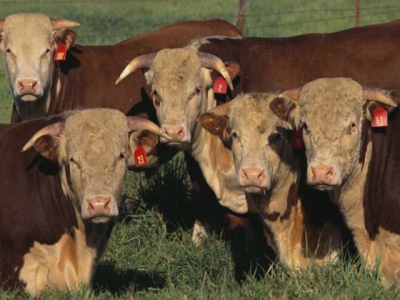New cattle genes tied to feed efficiency

Study pinpoints 19 genes linked with feed efficiency, which could help reduce carbon footprint of cattle farming.
A newly discovered series of genes related to feed efficiency could pave the way to making cattle farming cheaper and more sustainable, according to a new study by University of Alberta researchers.
University of Alberta ruminant biologist and microbiologist Le Luo Guan and her research team showed that of the 20,000 genes expressed in the bovine rumen, liver, muscle and back fat — key tissues involved in energy metabolism — 19 seem to be associated with feed efficiency.
Hui-Zeng Sun, a post-doctoral fellow in Guan’s lab, made the discovery by using functional genomics and computational statistics to shed some light on the mechanics involved in feed efficiency, a complex biological process that remains poorly understood, the university said.
“This is laying the groundwork for us to use these genes when doing genomic selection for feed-efficient animals in cattle breeding programs,” Sun, the study’s lead author, said.
According to Sun, a single bull or cow can produce up to 500 liters of methane — a potent greenhouse gas — when it digests its daily meals. The more an animal eats, the more methane it produces.
Scientists are, therefore, trying to lessen the carbon footprint of cattle farming by maximizing feed efficiency.
“Two people who eat the same amount of food might not gain the same weight because of differences in their metabolism,” Sun said. “It’s the same with animals. Efficient animals need less feed to extract an equivalent amount of energy and, ultimately, produce the same amount of meat. It also means savings for cattle farmers.”
With projections for the world population to push 10 billion people by 2050 and food needs rising, Sun suggested that the demand for feed-efficient livestock will increase steadily in coming years.
Guan’s lab is now validating the work in larger, industry-based experiments -- a step they hope will confirm that the 19 identified genes show up in animals known to display higher feed efficiency.
The researchers also hope to figure out the molecular mechanics involved in turning each gene on or off, the University of Alberta said. If they succeed, Sun thinks they could be building the foundation of a sustainable, energy-efficient beef industry.
The research was funded by the Alberta Livestock & Meat Agency, Alberta Agriculture & Forestry and the Natural Sciences & Engineering Research Council of Canada.
The study, “Landscape of Multi-tissue Global Gene Expression Reveals the Regulatory Signatures of Feed Efficiency in Beef Cattle,” was published in Bioinformatics.
Có thể bạn quan tâm
 Midwest cattle face potential heat stress
Midwest cattle face potential heat stress Seven-day forecast shows above-average temperatures in parts of Nebraska and Iowa, with heat indexes that will reach critical heat stress emergency.
 Spiced-up ration may improve cattle health
Spiced-up ration may improve cattle health Research at New Mexico State University's value-added agriculture center examining use of chili pepper byproducts to treat inflammation in livestock.
 Systems project examines sustainability of Iowa cow/calf sector
Systems project examines sustainability of Iowa cow/calf sector Competition from volatile grain prices and recreational land uses in Iowa has reduced pasture and forage area by more than 2 million acres -- an 88% decrease